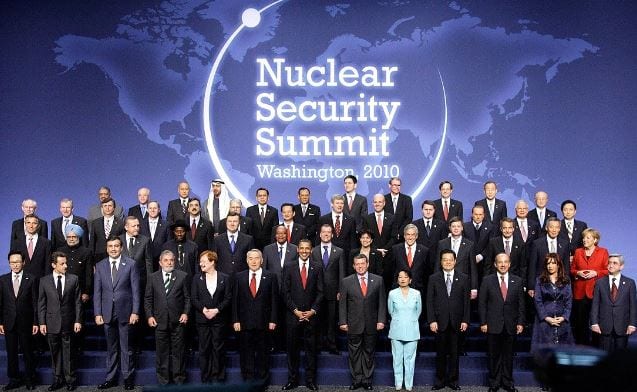
By Tom McGregor, CNTV Commentator
Our world faces tumultuous times amid the spread of terrorism, some terrorists would tryto get their hands on dirty bombs (radioactive weapons).
Prospects seem more appalling since terrorists hold suicidal aims to blast the world into pieces. Implementing stronger security measures calls for sovereign governments to enhance global cooperation to stem the tide of terrorism.
At this critical moment, Chinese President Xi Jinping arrived in Washington D.C. to attend the 4th Nuclear Security Summit from March 31 to April 1, where more than 50 national leaders and four international organizations were in attendance.
The summit’s agenda focused on the safety of handling nuclear materials, preventing nuclear reactor leaks, as well as addressing nuclear weapons proliferation and terrorism.
Keeping dirty bombs out of the wrong hands
The possibility of the IS possessing dirty bombs is not a joking matter, posing as a real and ominous threat. A terrorist could steal nuclear materials from scientific research labs at a university or hospital, where such civilian facilities are not guarded by military personnel.
Compelling Read: Negative Rates are God send for the Greedy, unscrupulous corporate world
Covert agents, working on behalf of IS, could pose as chemists, storage clerks, security guards or medical workers to obtain uranium or plutonium and then transfer the isotopes to a secret location to build a bomb. Constructing an atom bomb is not difficult, considering that anyone could visit a university shop to purchase nuclear-chemistry textbooks.
Accordingly, governments have a responsibility to work more closely with universities and hospitals to ensure that the right precautions are taken to prevent criminals from gaining access to radioactive materials.
Asia’s largest nuclear security center
The Chinese government has already engaged in proactive measures to support nuclear safety. Last December, the China Atomic Energy Authority (CAEA) had completed construction of the Center of Excellence on Nuclear Security (COE)in suburban Beijing.
As the largest, best equipped and most advanced facility of its kind in the Asia-Pacific region, the COE will serve as a venue for a variety of international exchanges and cooperation programs. The Center plans to train 2,000 nuclear security staff for China and Asia-Pacific nations each year.
“China will make full play of the center as a demonstration platform,” Chinese Foreign Ministry spokesperson Lu Kang told the Global Times. “China has been dedicated to the nation’s nuclear security level and has been promoting international cooperation.”
The center was established in partnership with the United States and was inaugurated in Beijing on March 18, while Washington has agreed to provide nuclear security equipment. The center was completed for construction one year ahead of schedule, which marks a milestone for China’s development in the nuclear industry.
Extending nuclear energy capacity
China has plenty of reasons to boost its nuclear security. The nation has 30 nuclear power plants in operation and 24 generators are under construction, scheduled for completion by 2020.
China’s 13th Five-Year Plan has highlighted Beijing’s pledge to upgrade nuclear and radiation safety by offering more training on prevention and how to cope with accidents.
Earlier this year, CAEA had published its nuclear white paper saying that China had “the most advanced technology and most stringent standards to ensure safety and efficient development of nuclear power.”
Staying nuclear risk-free needs global cooperation
Keeping the world safe from nuclear disasters and terrorism would need international cooperation. A nation cannot stand alone to halt a nuclear catastrophe. Fortunately, Beijing is playing a pivotal role to maintain nuclear security, despite the challenges that confront our world.
Other articles of Interest
Negative rates fantastic for speculators but terrible for global economy (April 16)
How will Gold fare in a negative interest environment (April 14)
Electric Vehicles set to wreck havoc on Crude oil market (April 13)
Oops we are doing it again; Subprime Auto Loan Crisis party has begun (12 April)
Federal Reserve’s Game plan; create a new class of slaves (12 April)


